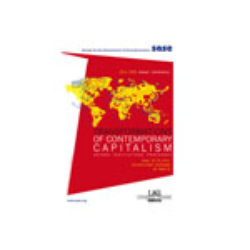SASE 23rd Annual Conference, ''Transformations of Contemporary Capitalism: Actors, Institutions, Processes''

Organised by SASE (Society for the Advancement of Socio Economics) June 23-25 2011, Madrid | Universidad Autónoma de Madrid
http://www.sase.org/index.php?option=com_content&task=view&id=279&Itemid=99#Theme7
For more informations, please click here to access to SASE's website.
Among the speakers: Dieter Plehwe, David Miller, and David Levi-Faur who organize a mini-conference whose subject is : ''The Rise and Decline of Neoliberalism: Scientific Communities, Political Technocracy, and Regulatory Regimes.''
The transformation of capitalism in the last three decades has been driven at least partly by neoliberal reform strategies. Notions of competitive statehood have been strengthened at the expense of solidarity norms prevalent during the previous age of embedded liberalism. If market failure were the constitutive paradigm of the original age of regulatory reform and the welfare state, state failure can be regarded as the paradoxical Leitmotiv of the rise of neoliberalism. Resulting varieties of capitalist governance at various levels (sector, national, EU, global etc.) are currently on trial due to the global financial and economic crisis. But the crisis at the same time has revealed a surprising lack of alternatives, little by way of regulatory imagination, developmental strategies and social solidarity. In the face of apparent contradictions and pathologies of the neoliberal strategies scholars are invited to revisit the history of state, social and economic reform in order to help better understanding conditions of reforms that may move more expressly beyond previous concerns with market or state failure in the future. Proposals for panels might be designed to revisit the history and theories of the state and regulation in general, and the role of intellectual and institutional entrepreneurship involved in the rise and climax of neoliberalism in particular. Proposals are encouraged that will contrast and more closely examine competing regulatory belief systems, paradigms, and policy ideas in conjunction with changing institutional circumstances, interest groups and other constituencies, organizational landscapes (academic research institutes, think tanks, networks etc.) and the concomitant composition of regulatory communities and elites.
Related articles
http://www.thejournalofregulation.com/The-Rise-and-Decline-of.html


your comment